Сыма Цянь. Исторические записки (Шицзи). Том 6
Подождите немного. Документ загружается.

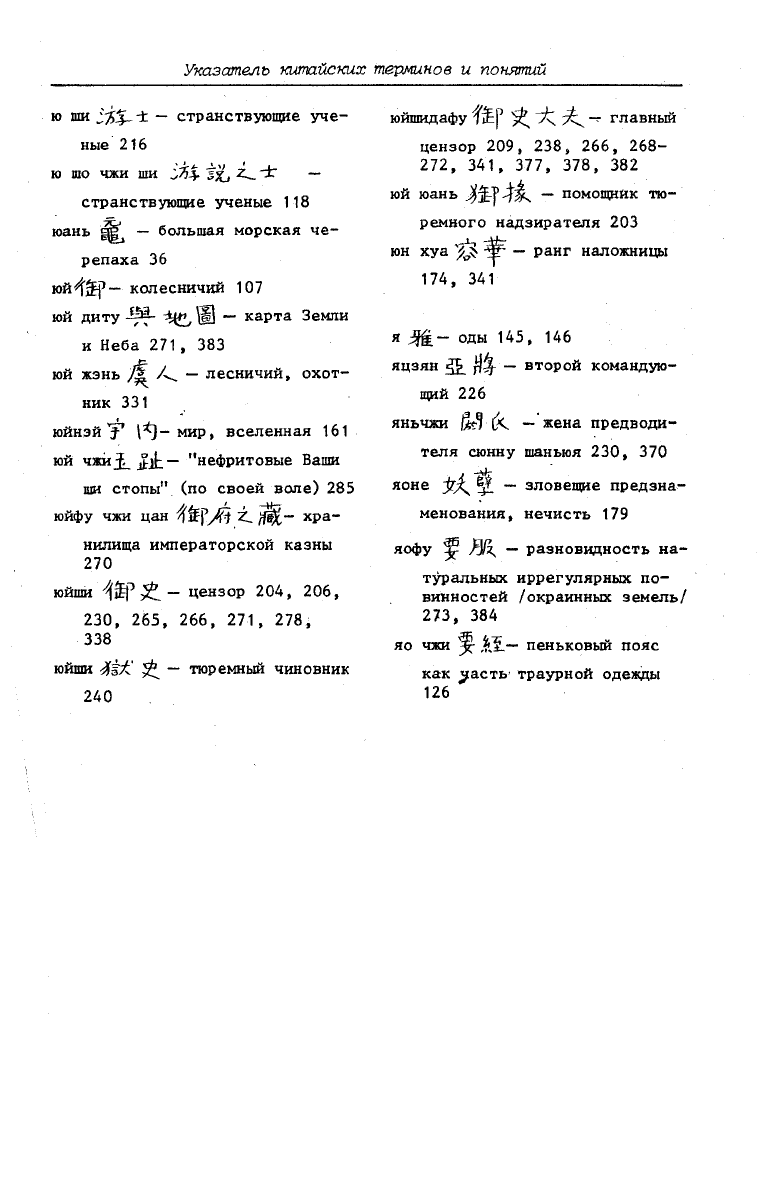
Указатель китайских
терминов
и понятий
«™
ij>%-
"±
~ странствующие уче- юйшидафу
flEf
^ 7^ ^ - главный
ные
216 цензор 209, 238, 266, 268-
шо чжи ши
MUL^*
-
2П
'
34П 377
'
378
'
382
странствующие ученые 118
юй юань
Щ& ~
п
°«°Щ««к
-по-
ремного
надзирателя 203
юань Щ2 — большая морская че-
репаха 36
юн хуа
^ ^ ~
ранг
юй^^р-
колесничий
107 174, 341
юй
диту-^- ^tf^lS! — карта Земли
и
Неба 271, 383
я
Я£~
оды 145
'
146
юй
жэнь ^ ^ - лесничий, охот-
я
«
зян
S. Ш ~
ВТ
°Р°
Й
командую-
ник 331 щий 226
юйнэй
?
\*}-
мир, вселенная 161
яньчжи
^ ^ -'
жена
"РВДводи-
юй чжиЗ^оЬ- "нефритовые
Ваши
теля
^"У
шаньюя 230
«
370
ши
стопы"
(по
своей
воле) 285
яоне
#А Ч- ~ зловещие предзна-
юйфу
чжи цан ^fcpy^ZL^- xpa- менования, нечисть 179
нилища
императорской казны
яо
ф
у
|ffi . разновидность на-
270 •
Л>ип
rtt туральных иррегулярных по-
юйши
WX.- Цензор 204, 206, винностей /окраинных земель/
230, 265, 266, 271, 278,
273
»
384
33
яо чжи jjr-
,^5.~
пеньковый пояс
юйши
MX :£ - тюремный чиновник
как
^
асть
,
тра
ур
Н
ой одежды
240
126

SUMMARY
What we have here is the- sixth volume of 'a glossarial
translation into Russian of a remarkable monument of ea-
ly Chinese and world historiography,
Historical
Notes,
ear-
Ssu-ma ch'ien (145-87
B.C.),
which traces Chinese History
from hoary antiquity to the close of the first millen-
nium B.C. This massive effort by the 'father of Chinese
history' runs to over half a million hieroglyphs and
130
chapters,
broken down into five big sections. The
previous volumes in our, series were, The
Fundamental
Notes
(or
Annals)
-
Pen-ahi
(Vols. 1 and 2, published in 1972 and
1975);
Chronological Tables
- Piao (Vol. 3,
1984);
Treatises
- Shu (Vol. 4,
1986) and the first ten chapters of the fourth section,
Hereditary Houses
—
Shih-ahia
(Vol. 5,
1987).
Volume 6 consti-
tutes a translation of the remaining twenty chapters of
the
Hereditary Houses
section (chapters 41-60 of
Shihahi),
putting the finishing touches to translation of the
first four sections of the monument.
We have already elucidated in the preface to Volume 5
the historically evolved meaning of 'jia' and Shih-ahia
(clan,
patronimy, a noble hereditary house) and stressed
that these chapters used appropriate chronicles and li-
neages of the princely houses of the Chou period, which
survived until the Han empire. As noted (Vol. 5,
pp.15-16),
the section describes the world of hereditary nobility
and its retinue, scattered throughout the country. Its
chapters offer pene-trating clues to the diverse aspects
of Chinese society, the state structure, the nature of
political affray, ethnic processes, and the forms of ea-
rly Chinese ideology.
Chapters in this -volume may tentatively be divided
into several groups. The first, spanning chapters
41-45,
takes up the story of individual kingdoms and principa-
lities in the Chou China (Yue, Cheng, Chao, Wei and Han).
Remarkably, the narrative's mood and detail are fairly
variable.
Patently standing out here is the second group cove-
ring chapters
47-49.
Chapter 47 is on the early Chinese
philosophic luminary Confucius. It is China's earliest
consistent biography of him. Significantly enough, while
giving full credit to the founder of Confucianism, the
historian would not eulogize both the man and his school.
Chapter 48 follows the life of a certain farmhand Ch'en.
She who led China's first popular uprising against the
482
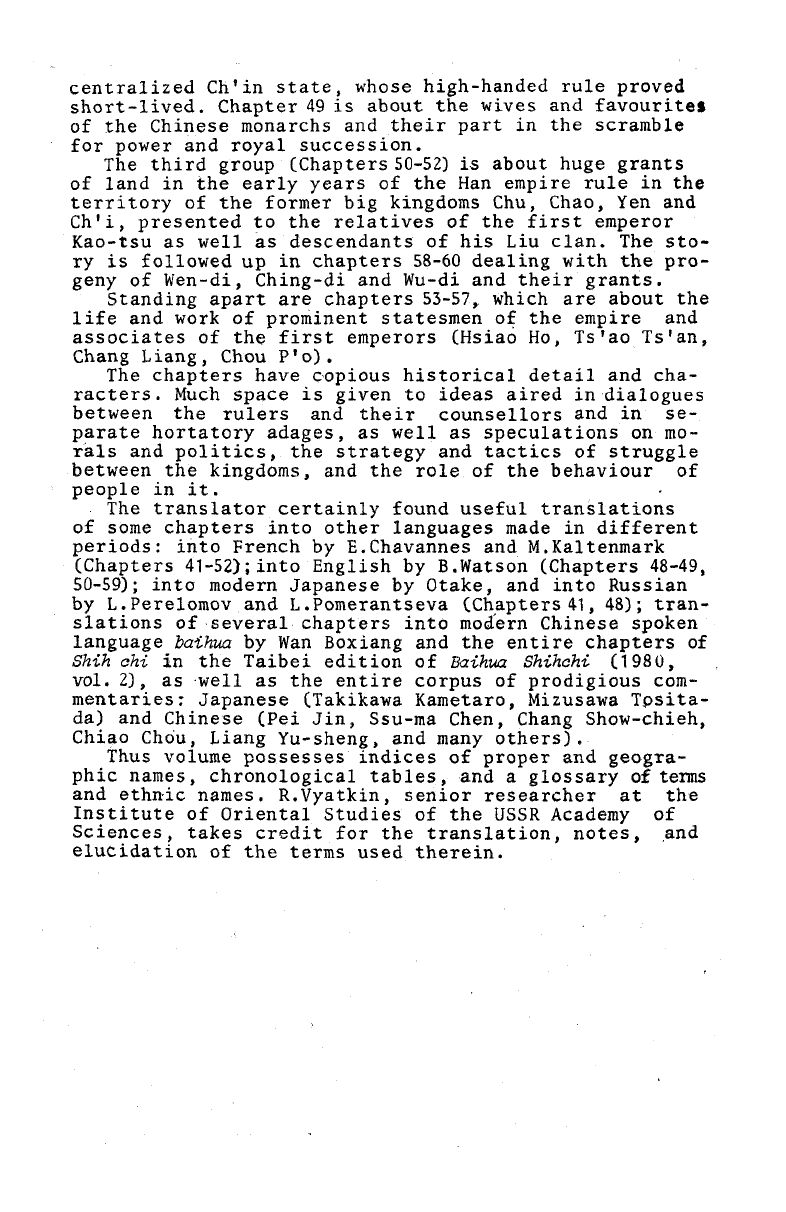
centralized Ch'in state, whose high-handed rule proved
short-lived. Chapter 49 is about the wives and favourites
of the Chinese monarchs and their part in the scramble
for power and royal succession.
The third group (Chapters
50-52)
is about huge grants
of land in the early years of the Han empire rule in the
territory of the former big kingdoms Chu, Chao, Yen and
Ch'i,
presented to the relatives of the first emperor
Kao-tsu as well as descendants of his Liu clan. The sto-
ry is followed up in chapters 58-60 dealing with the pro-
geny of Wen-di, Ching-di and Wu-di and their grants.
Standing apart are chapters
53-57,
which are about the
life and work of prominent statesmen of the empire and
associates of the first emperors (Hsiao Ho, Ts'ao Ts'an,
Chang Liang, Chou P'o).
The chapters have copious historical detail and cha-
racters.
Much space is given to ideas aired in dialogues
between the rulers and their counsellors and in se-
parate hortatory adages, as well as speculations on mo-
rals and politics, the strategy and tactics of struggle
between the kingdoms, and the role of the behaviour of
people in it.
The translator certainly found useful translations
of some chapters into other languages made in different
periods:
into French by E.Chavannes and M.Kaltenmark
(Chapters 41-52);into English by B.Watson (Chapters
48-49,
50-59);
into modern Japanese by Otake, and into Russian
by L.Perelomov and L.Pomerantseva (Chapters
41,
48);
tran-
slations of several chapters into modern Chinese spoken
language
baihua
by Wan Boxiang and the entire chapters of
Shih ohi
In the Taibei edition of
Baihua Shihahi
(1980,
vol.
2),
as well as the entire corpus of prodigious com-
mentaries:
Japanese (Takikawa Kametaro, Mizusawa Tpsita-
da) and Chinese (Pei Jin, Ssu-ma Chen, Chang Show-chieh,
Chiao Chou, Liang Yu-sheng, and many
others).
thus volume possesses indices of proper and geogra-
phic names, chronological tables, and a glossary of terms
and ethnic names. R.Vyatkin, senior researcher at the
Institute of Oriental Studies of the USSR Academy of
Sciences,
takes credit for the translation, notes, and
elucidation of the terms used therein.
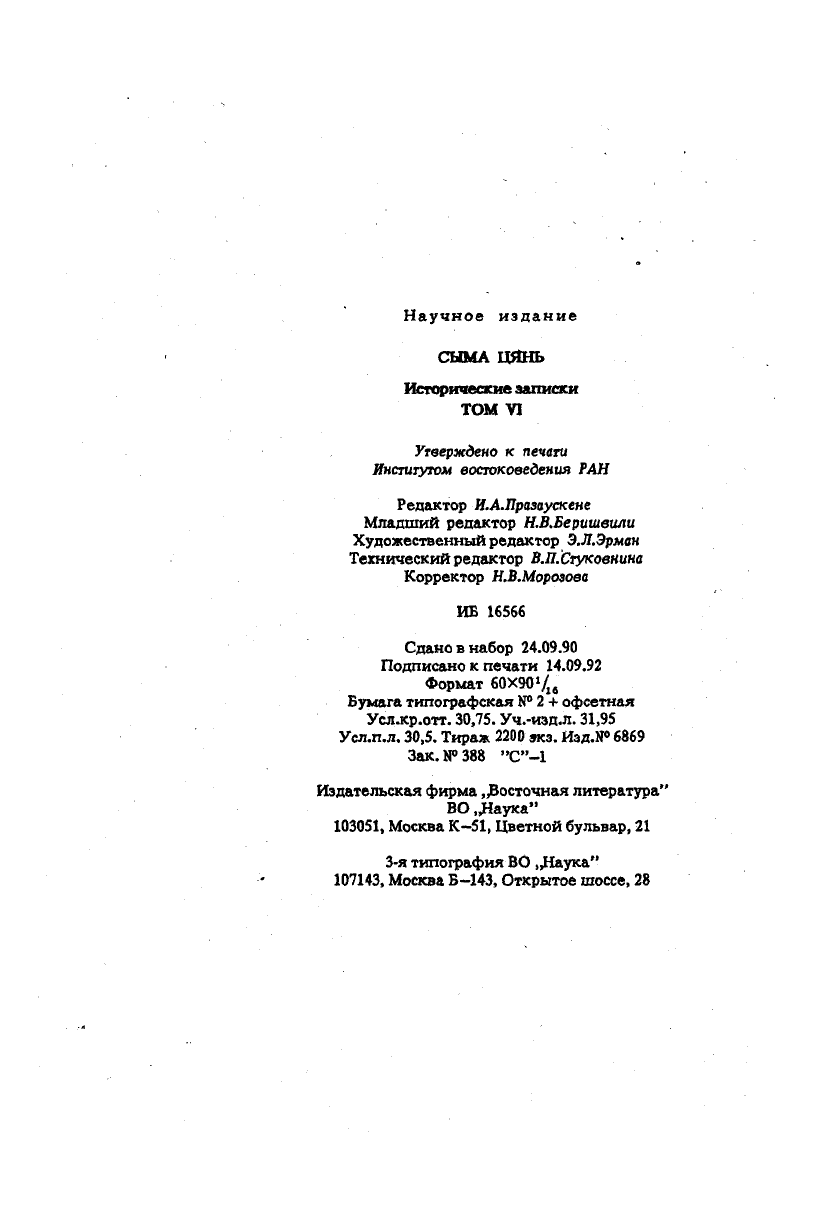
Научное
издание
СЫМА ЦЯНЬ
Исторические
записки
ТОМ
VI
Утверждено
к
печати
Институтом
востоковедения
РАН
Редактор
И.А.Празаускене
Младший
редактор
Н.В.Беришвили
Художественный
редактор
Э.Л.Эрман
Технический
редактор
В.П.Стуковнина
Корректор
Н.В.Моро$ова
ИБ
16566
Сдано
в
набор
24.09.90
Подписано
к
печати
14.09.92
Формат
6ОХ907
16
Бумага
типографская
№
2
+
офсетная
Усл.кр.отт.
30,75.
Уч.-изд.л.
31,95
Усл.п.л.
30,5. Тираж
2200
SKS.
Изд.№
6869
Зак.
№
388
"С"-1
Издательская фирма .Досточная
литература"
ВО „Наука"
103051,
Москва
К-51,
Цветной
бульвар,
21
3-я типография ВО „Наука"
107143,
Москва Б-143, Открытое шоссе,
28
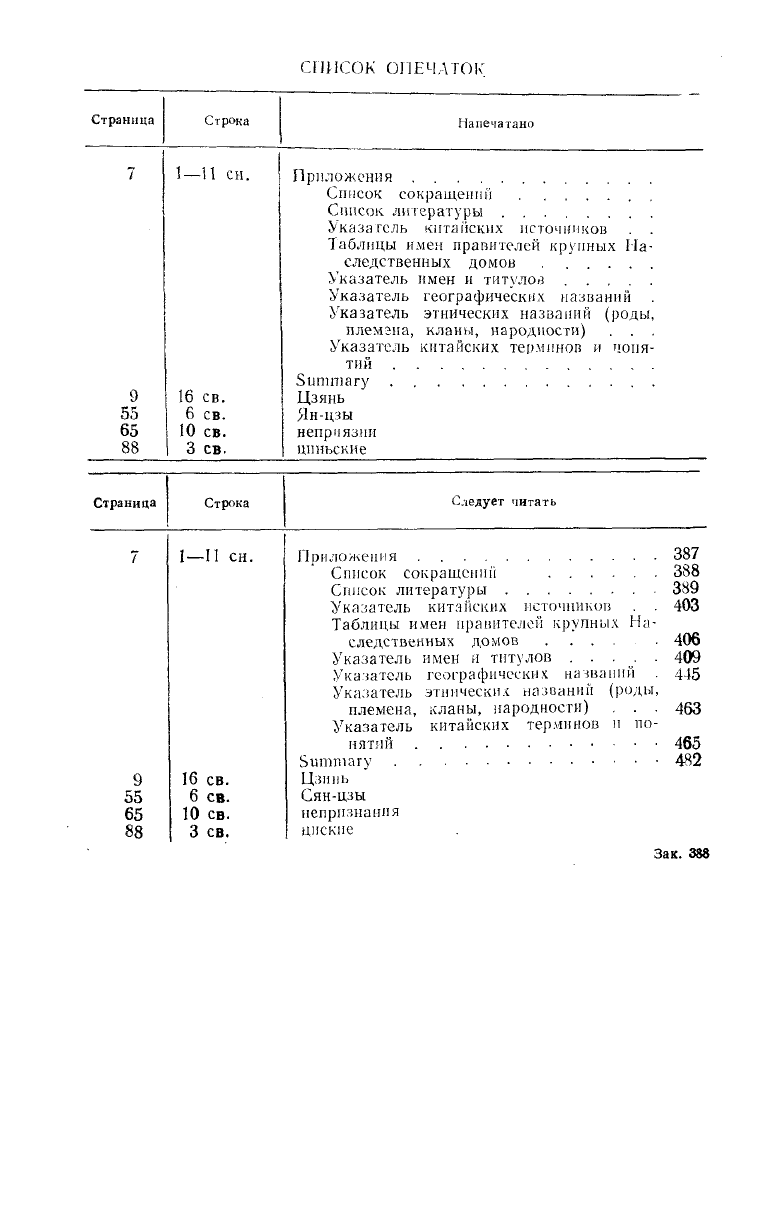
СПИСОК
ОПЕЧАТОК
Страница
7
9
55
65
88
Строка
1—11 СИ.
16 св.
6 св.
10 св.
3 св.
Приложения
Напечатано
Список
сокращении
Список
ли
Указа
гель
ературы
. . .
китайских источников . .
Таблицы имен правителей крупных На-
следственных домов . . .
Указатель
Указатель
Указатель
племэна,
Указатель
тий
Summary
Цзянь
Ян-цзы
неприязни
циньские
имен и
титулов
. .
географических названий
этнических названий (роды,
кланы,
народности) . . .
китайских терминов и попя-
Страница
1
9
55
65
88
Строка
1
—И
СН.
16 СВ.
6 СВ.
10 св.
3 св.
Следует
читать
Пои
'Юження
Список
сокращений
Список
литературы
Указатель
китайских источников . .
Таблицы имен правителей крупных На-
следственных домов ....
Указатель
имен и
титулов
Указатель
географических названий .
Указатель
этнических названий (роды,
племена, кланы, народности) . . .
Указатель
китайских терминов и по-
нятий
Si miniarv
Цзннь
Сян-цзы
непризнания
цнекие
387
388
389
403
406
409
445
463
465
482
Зак.
3SS
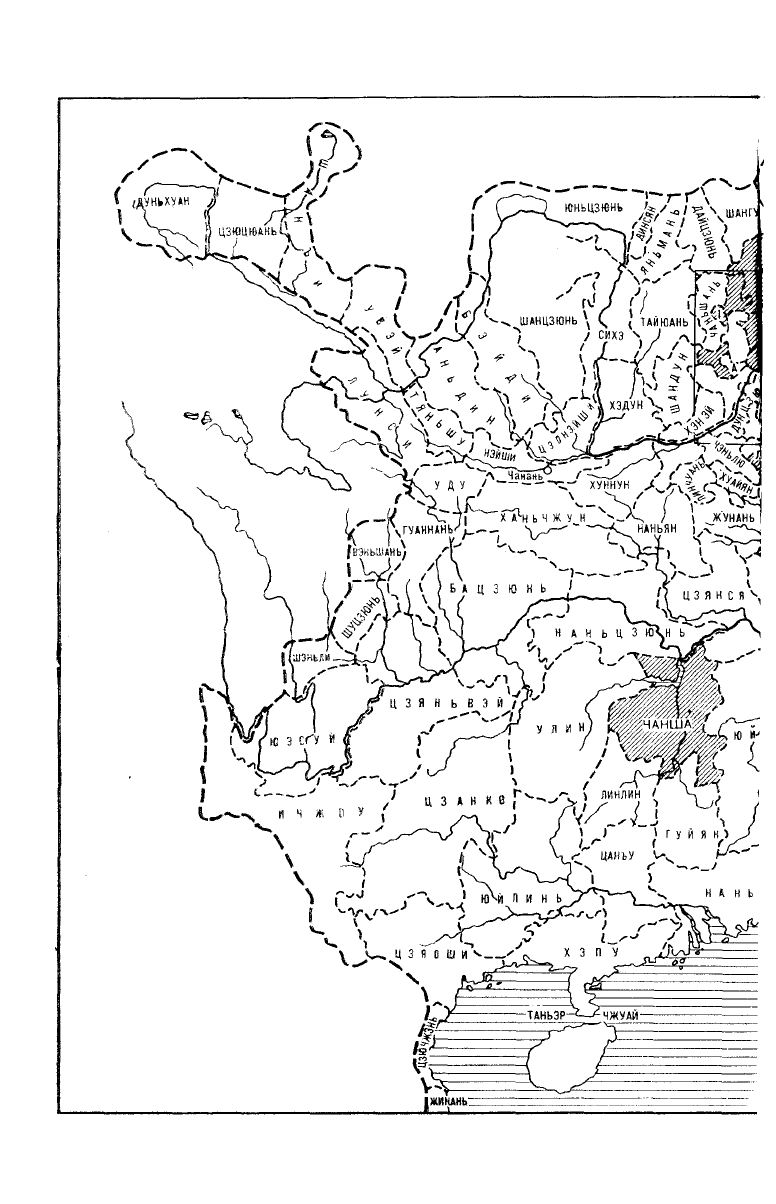
X^^^r^s^/-/^
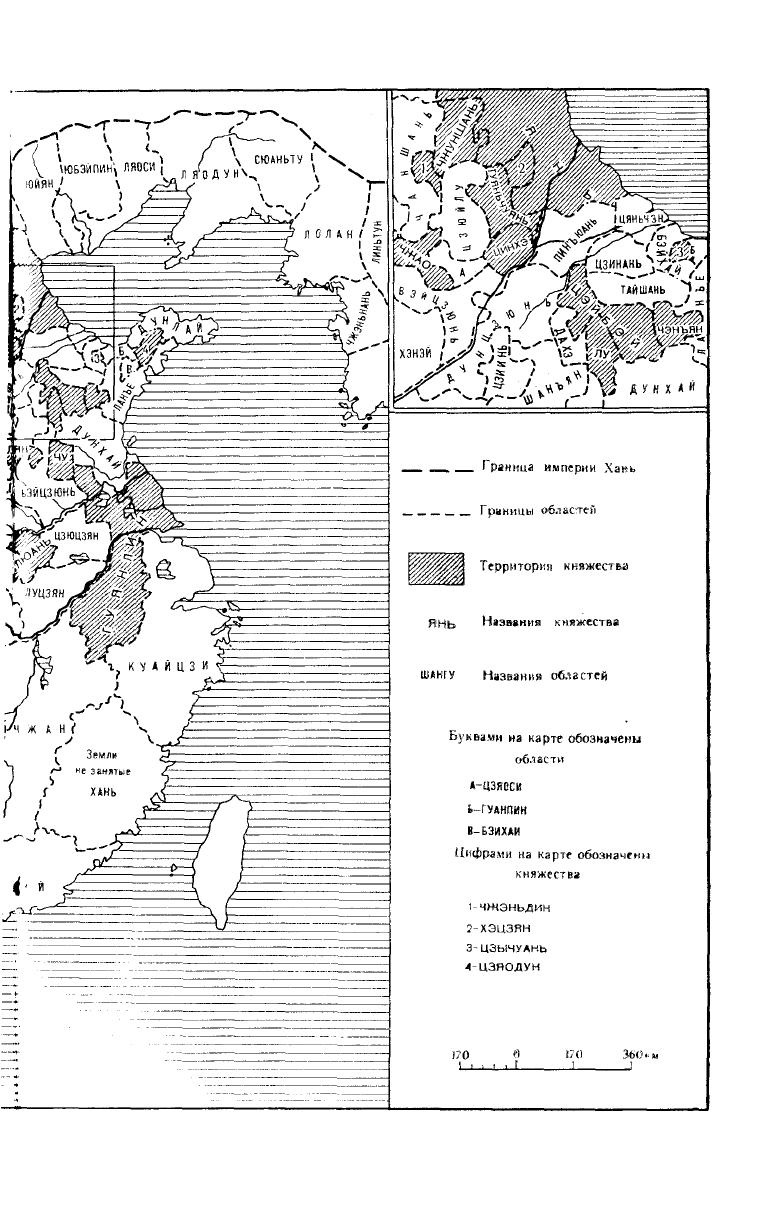
V шэйтцляоси,
л
/
одун
\
__ , Граница империи
Хавь
Границы областей
Буквами на карте обозначены
области
Д-ЦЗЯОСИ
Ь-ГУДИПИН
В-БЭИХАИ
Цифрами на карте обозначен»!
княжества
1-чжэньдин
г-хэцзвн
3-ЦЭЫЧУАНЬ
•4-ЦЗВОЛУН
I/O « 170 360..
I • • • , I I I
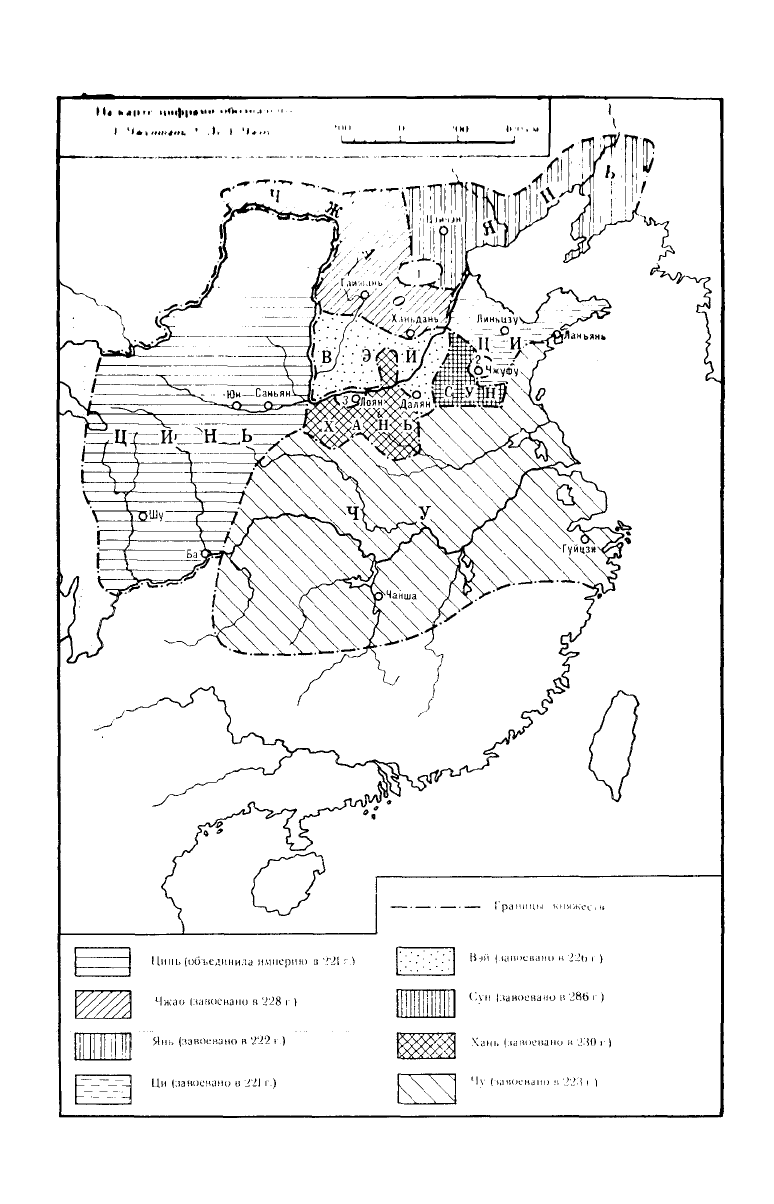
Ниш.
(объединила империю
и 'i'2\
•
)
•као
|;шюенано
в 228 г
:Ub
i
)
HO
[I
'J8t>
I
)
Янь
(завоевано
в
ЧТ2
\
) K55vVi Xam. (.idw»ir»ano
ti
l"l\
\

ЧАНША
Названия областей
плллплши Великая Китайская стена
На карте цифрами обозначены
названия областей
Граница империи
Границы областей
0
Столица империи
О (im.iMiiM областей
I—Юньчжун
2—Гуанъян
З—Хэншань
4—Ханьдань
5—Хэнэй
6-Инчуань
7—Линьцзу
8—Сюецзюнь
